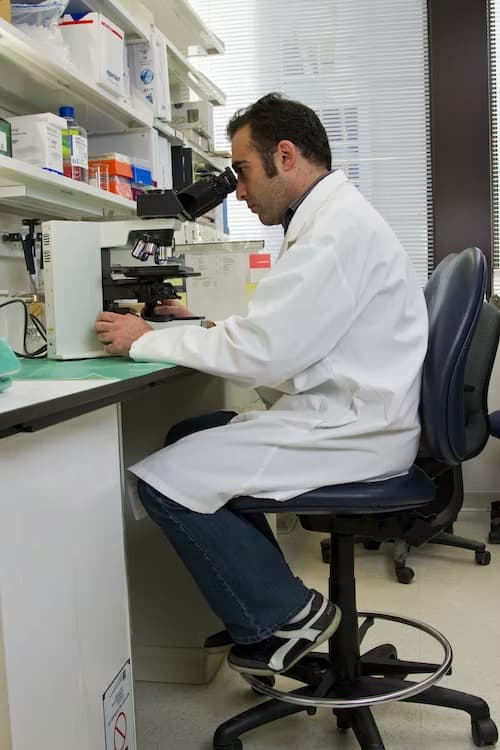Until now, the main marker of aging has been the length of the terminal sections of chromosomes – telomeres. To date, it is clear that short telomeres are a reflection of the low level of the ability of cell systems to repair DNA damage, including telomeres, which corresponds to an increased risk of developing cancer and diseases of the cardiovascular system. According to scientists, this is one of the reasons for body aging.
Causes of Human Aging
Types of aging in the human body are diverse. One such type of aging at the molecular level is telomere shortening. Telomeres are complexes of proteins with RNA that protect the ends of chromosomes. With each cycle of cell division, telomeres are shortened, which leads to “replicative aging” of the cell. Since telomeres shorten during aging in various organs and tissues, their length can be a biomarker of aging. Telomeres are the ends of chromosomes that are thought to have a protective function in chromosomes. Starting from infancy, their sizes are gradually reduced: on average, up to two times by adulthood and up to four by the elderly. According to scientists, this is one of the causes of aging in the body.
Telomeres shorten due to the following factors:
- unhealthy diet (overabundance of sugar and omega-6 in the diet, the use of processed foods);
- overeating and excess weight;
- environmental pollution (chemical, electromagnetic, sound);
- poor emotional and social relationships with other people;
- sedentary lifestyle;
- lack of sleep;
- constant stress;
- chronic pain;
- smoking;
- insulin resistance;
- chronic inflammation;
- vitamin D deficiency.
Another factor that causes the shortening of telomeres, as studies have shown, is infection. In Petteri Ilmonen’s lab, scientists experimentally tested whether Salmonella enterica is the cause of telomere shortening in domesticated wild mice. Mice were challenged several times with five strains of S.enterica over several months. The control group included related mice. A real-time test determined telomere length in white blood cells after infection. The results showed that repeated Salmonella infection causes telomere shortening, especially in males compared to females. Scientists also found that faster telomere shortening increased mortality risk, but these results were not statistically significant.
In people under prolonged stress, telomeres shorten much faster than their peers in a normal situation. The length of telomeres in women experiencing long-term chronic stress is equivalent to that of those who are 10 years older but lead a normal life. Therefore, to prevent cell aging, it is important to keep the body in good shape with the help of physical exercise, learn to manage stress, and lead a healthy lifestyle. Positive emotions and endorphins will also be a good addition to this lifestyle. And even more fun will bring the game to play-fortune.pl/kasyno/wyplacalne-kasyna where bonuses and gameplay will help everyone improve their health and financial condition.
New POI
Now the interests of gerontologists are gradually shifting from telomerase and life extension as such to other biological mechanisms and indicators. If it is impossible to guarantee a person’s lifespan to 100, 120, or 150 years, perhaps there are ways to improve the quality of life in recent years – even if a person lives “only” 80 years. It’s no secret that the last years of life often become a real torment. Many metabolic, autoimmune, malignant, and degenerative diseases develop with age. Of course, many researchers have tried to find a way to prevent this. However, for a long time, the reason for the development of this complex remained unclear.
The main cause of the development of a group of senile pathologies is chronic systemic inflammation that develops with age. Among the many candidates for the role of the causative agent of chronic inflammation, the theory of senescent cells has received the greatest scientific support. In 2011, a breakthrough came in this area when a team led by James Kirkland and Jan van Deursen at the Mayo Clinic showed that deleting cells that carry one of the markers in mice. The so-called p16 protein, involved in cell life cycle control, leads to partial rejuvenation of individuals.

Final Thoughts
Until recently, telomeres were considered the main way to prolong human life. Today, it seems, the “first telomeric winter” is coming: everything that could be done with the help of the “immortality enzyme” has already been done. Telomerase does not point the way to a long life; it only helps us know our limits to understand that the lifespan is between early aging and uncontrolled tumor formation. The attention of scientists is gradually shifting to other ways to combat aging and prolong life. Senescent cells, various diets, and medications – may not fully understand ways to add years to a person. What will happen to the telomere? Perhaps, from hope for humanity, it will turn into a toy for scientists for some time: strange, but in a sense, it is not bad. But for now, recipes for old age should be looked for elsewhere – it could be like climate change, ecology, play-fortune.pl/metody-platnosci/ezeewallet or completely new drugs.Thus, after studying telomeres, scientists can conclude what is necessary for life expectancy: eat right and lead a healthy lifestyle; avoid stressful situations, infections, and obesity; the diet requires a certain amount of vitamins B12, folic acid, B6, E, D and the mineral elements magnesium and zinc. All these factors affect genetics in general and the cell’s lifespan. As mentioned above, a healthy lifestyle is enough to feel young and healthy.
Less speculation would allow it to be again “just” an important element for biological, biochemical, and genetic research. Of course, it is a pity if this road to immortality ends as a dead end. But what can you do: many useful lessons can be learned from the experience with telomerase. In a year or ten, a discovery in the field of chromosomal genetics will explode the scientific world and raise a new wave of interest in telomeres and their features.
